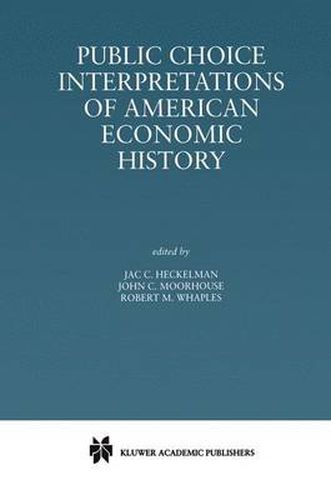Readings Newsletter
Become a Readings Member to make your shopping experience even easier.
Sign in or sign up for free!
You’re not far away from qualifying for FREE standard shipping within Australia
You’ve qualified for FREE standard shipping within Australia
The cart is loading…






This title is printed to order. This book may have been self-published. If so, we cannot guarantee the quality of the content. In the main most books will have gone through the editing process however some may not. We therefore suggest that you be aware of this before ordering this book. If in doubt check either the author or publisher’s details as we are unable to accept any returns unless they are faulty. Please contact us if you have any questions.
Jac C. Heckelman, John C. Moorhouse and Robert Whaples The eight chapters of this volume are revised versions of papers originally presented at the Applications of Public Choice Theory to Economic History conference held at Wake Forest University, April 9-10, 1999. They all apply the tools of public choice theory to the types of questions which economic historians have traditionally addressed. By adding the insights of public choice economics to the traditional tools used to understand economic actors and institutions, the authors are able to provide fresh insights about many important issues of American history. 1. DEVELOPMENTS IN PUBLIC CHOICE THEORY Economists have historically sought to develop policies to improve social welfare by correcting perceived market failures due to monopoly power, externalities, and other departures from the textbook case of the purely competitive model. An underlying assumption is that the public sector, upon recognizing the market failure, will act to correct it. Applied work often develops the conditions under which these policies will be optimal. The public choice movement has questioned the false dichotomy established by welfare economists. Economists of all persuasions assume traditional private market actors, such as entrepreneurs, managers, and consumers, are self-interested rational maximizers. Why should this not hold for all economic agents? The innovation of public choice analysis is to show what happens when public sector actors, such as politicians, bureaucrats, and voters, also behave as rational self-interested maximizers.
$9.00 standard shipping within Australia
FREE standard shipping within Australia for orders over $100.00
Express & International shipping calculated at checkout
This title is printed to order. This book may have been self-published. If so, we cannot guarantee the quality of the content. In the main most books will have gone through the editing process however some may not. We therefore suggest that you be aware of this before ordering this book. If in doubt check either the author or publisher’s details as we are unable to accept any returns unless they are faulty. Please contact us if you have any questions.
Jac C. Heckelman, John C. Moorhouse and Robert Whaples The eight chapters of this volume are revised versions of papers originally presented at the Applications of Public Choice Theory to Economic History conference held at Wake Forest University, April 9-10, 1999. They all apply the tools of public choice theory to the types of questions which economic historians have traditionally addressed. By adding the insights of public choice economics to the traditional tools used to understand economic actors and institutions, the authors are able to provide fresh insights about many important issues of American history. 1. DEVELOPMENTS IN PUBLIC CHOICE THEORY Economists have historically sought to develop policies to improve social welfare by correcting perceived market failures due to monopoly power, externalities, and other departures from the textbook case of the purely competitive model. An underlying assumption is that the public sector, upon recognizing the market failure, will act to correct it. Applied work often develops the conditions under which these policies will be optimal. The public choice movement has questioned the false dichotomy established by welfare economists. Economists of all persuasions assume traditional private market actors, such as entrepreneurs, managers, and consumers, are self-interested rational maximizers. Why should this not hold for all economic agents? The innovation of public choice analysis is to show what happens when public sector actors, such as politicians, bureaucrats, and voters, also behave as rational self-interested maximizers.